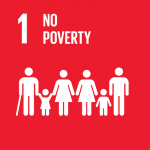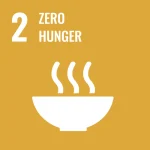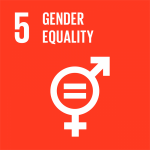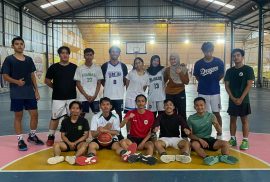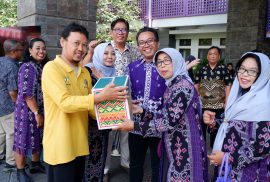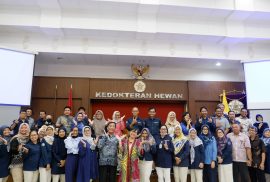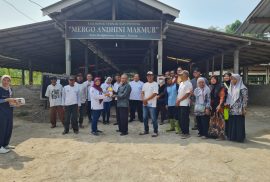From May 9-15May 2025, the Upskill program was implemented, initiated by the Semi-Autonomous Agency (BSO) under the auspices of OSVET. This activity includes regular training for basketball, futsal, dance, band, softball, badminton, volleyball, and table tennis.
SDG 5: Gender Equality
In this bazaar, permanent and contract education staffs, as well as outsourced workers, received affordable basic necessities containing cookies, syrup, oil, rice, eggs, wheat flour, and instant noodles. In addition, cheap basic necessities were also sold to visitors, such as oil, wheat flour, eggs, and instant noodles.
In this bazaar, there were 22 MSME booths participating. The stalls sold various food and snack products such as fried meatballs, gudeg, bakpia, as well as fashion products, skincare, and various household items such as daster, nuskin skincare, and batik clothes. Orchids are also available which are in great demand by visitors. There is also a special promo for FVM UGM’s superior product, namely Omega 3, 6, 9, DHA and EPA Eggs.
The event was also enlivened by a mini fashion show featuring hand-made ethnic clothes from Lurik Sriti Gamplong. From the head of Dharma Wanita, Mrs. Yulaeni Teguh Budipitojo, to the vice deans, lecturers, and education staff, they all did the catwalk to showcase the lurik clothes. Furthermore, the event was supported by: Januputra Farm, Farm Berkah Sawung Sejahtera, Elita Kerudung, Crystal Petlove, and Cahaya Proyektor, as well as the donors, namely the DWP FKH UGM members, the Dean and vice deans, and all of the Departments at FVM UGM.
In addition to the bazaar, in order to welcome the holy month of Ramadan, DWP FVM also held social activities by visiting the Almarina Orphanage in Gunungkidul and the Ulil Albab Orphanage located in Banguntapan. The DWP FVM team provided basic necessities and clothing to these orphanages.
In addition, the DWP team also donated the homes of retired lecturers and education staff. This event aims to maintain the bond of fraternity between the extended family of FVM UGM. The existence of this activity is expected to be able to increase social awareness in the campus environment, provide benefits to others, and as moral and material support for those in need.
This bazaar and social service activity supports the values of the Sustainable Development Goals (SDGs), namely, SDG 1 No Poverty, SDG 2 Zero Hunger, SDG 10 Reduced Inequality, SDG 8 Decent Work and Economic Growth, SDG 5 Gender Equality, SDG 16 Peace, Justice, and Strong Institutions, SDG 17 Partnerships for the Goals.
Tuesday, the 16th of January 2025, Faculty of Veterinary Medicine UGM held Veterinary Inauguration Ceremony for 2024 December
Prof. Yayi as Chair of Prevention and Handling of Sexual Violence Team (PPKS) explained the definition of mental health, stages of mental health condition, triggers for mental disorders, as well as threats to mental health for generations Y and Z. People who are mentally healthy can recognize their potential, be productive in their activities in everyday life, resilient in facing problems, and able to contribute to the community. He also emphasized that individuals who have mental illnesses do not necessarily look like people suffering from illnesses in general, but that does not mean that their illnesses are no more serious than people who suffer from illnesses that attack the physical body.
Currently, the threats faced by the younger generation regarding mental health include the many options and distractions from social media, academic and non-academic demands from family and the surrounding environment, overthinking, and FOMO (Fear of Missing Out). Apart from that, other triggers include addiction to gadgets and online games, online gambling, cyber bullying, and excessive online shopping. These things can trigger stress which is defined as feelings of pressure, anxiety or tension. Stimulus or response that requires individuals to make adjustments.
Several coping methods that can be used to reduce mental disorders and stress include increasing mental health literacy, take a break from social media, and increase protective factors such as social networks and self-esteem. Build good habits from small things. Track time spent for a week. Take time for self-reflection. Always say thank you and be grateful. Set limits on doing assignments. Know your own limits. In the campus environment, reducing the risk of mental disorders can be done by creating a safe, comfortable and enjoyable learning atmosphere.
Furthermore, Prof. Yayi reminded us to always get enough rest, increase activities that suit your interests and talents, and eat more fruit and vegetables. Physical health has a good effect on mental health. Exercise can increase the hormone Endorphin (pain reliever, relax). He recommends regular and measured exercise, at least 150 per week (30 minutes per day). Choose what suits your situation, start gradually, and don’t force yourself. This also supports the HPU program towards a Healthy University.
After the presentation ended, the lecturers as participants were invited to conduct questions and answers with the speaker. Participants can share the problems they face regarding students’ mental health conditions. After that, the event closed with a group photo and handing of certificates.
Implementation of lecturer training activities in recognizing, treating and preventing student mental disorders is an effort to increase mental health literacy and commitment to creating a less-stressful space for the FKH UGM academic community. It is hoped that this event will increase participants’ knowledge and become the main provision for veterinary lecturers so that in the future they can better recognize, treat and prevent students’ mental disorders earlier.
Lecturer training event in recognizing, treating and preventing student mental disorders supporting SDGs (Sustainable Development Goals) values in point 3 Good Health and Wellbeing, SDG point 4 Quality Education, SDG point 5 Gender Equality, SDG point 10 Reduced Inequalities, SDG point 16, namely Peace, Justice and Strong Institutions, and SDG point 2, namely No Hunger.
During the event, the FKH UGM team performed reproductive examinations on the cattle using ultrasonography (USG) technology and provided vitamin supplementation. Additionally, they administered deworming medication for the cattle that were not pregnant, ensuring that the livestock received comprehensive care. The active participation of faculty staff and students undergoing reproductive internships significantly strengthened the implementation of this initiative.
Mr. Mulyono, the head of the Mergo Andhini Makmur Livestock Group, expressed his concerns during his speech, highlighting the severe impacts of the COVID-19 pandemic and outbreaks of Foot and Mouth Disease (FMD) and Lumpy Skin Disease. He reported a staggering 50% decrease in the population of female cattle, with the number dropping from 80 to approximately 40. “This situation is exacerbated by the difficulty female cattle have in becoming pregnant after the disease outbreaks,” Mr. Mulyono explained.
The examinations conducted by the FKH UGM team revealed that the ovarian conditions of some cattle that were struggling to conceive were actually good. However, there was a tendency for these animals to show difficulty in exhibiting estrus signs. The provision of vitamins and mineral supplements is expected to help restore the cattle’s health and improve their estrous cycles.
“Through this community service, we hope to re-establish cooperation and guidance from the university, which had been interrupted due to the COVID-19 pandemic,” Mr. Mulyono stated. This sentiment reflects the importance of civil society partnerships in achieving sustainable development goals, particularly in empowering local farmers and enhancing their livelihoods.
The event also featured traditional food prepared by the women’s farming group, showcasing local culture and community spirit. This aspect of the program not only nourished the participants but also highlighted the role of women in agriculture and food production, aligning with the SDGs focused on the empowerment of women.
The Department of Reproduction and Obstetrics at FKH UGM is committed to fostering ongoing collaboration and providing further guidance to support the recovery of this livestock group. Through this partnership, it is hoped that a sustainable positive contribution can be made to the welfare of farmers and the cattle population in Indonesia.
In conclusion, the collaboration between FKH UGM and the Mergo Andhini Makmur Livestock Group exemplifies a successful model of development assistance that integrates education, health, and economic resources. By addressing the challenges faced by local farmers and livestock, this initiative not only aims to restore cattle health but also to empower the community towards sustainable agricultural practices.
Contributor: Yosua Kristian Adi
